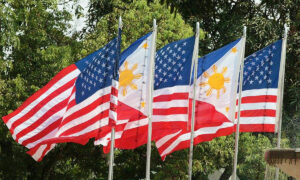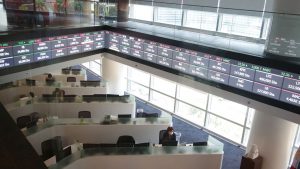By Kyle Aristophere T. Atienza, Reporter
THE PHILIPPINES should temper its security expectations from the United States and focus on strengthening ties with Asian nations on par with China’s might, amid the unpredictability in the American foreign policy, according to analysts.
Republican presidential candidate Donald J. Trump’s remarks on Friday raised concerns about America’s commitment to alliances, particularly amid China’s growing assertiveness in the South China Sea.
“It appears that Trump is not interested in a rules-based order. In contrast, he favors a transactional-based order,” Joshua Bernard B. Espeña, who teaches foreign policy at Polytechnic University of the Philippines, said in a Facebook Messenger chat.
Friday’s event was marked by Mr. Biden’s performance, which many in the international community described as unsteady — and in some cases disastrous — prompting calls for him to drop out of the 2024 race.
Citing a poll conducted by SSRS, CNN reported that voters who watched the presidential debate it hosted largely believed Mr. Trump, who was leading in all battleground states before Friday’s event, “outperformed” Mr. Biden.
“Republicans who watched the first 2024 debate expressed broad confidence in Trump’s performance, the poll finds, with Democrats less sanguine about their party’s presumptive nominee,” the news agency said.
“A near-universal 96% of GOP debate watchers say Trump did the better job in the debate, while a more modest 69% of Democratic debate watchers view Biden as the night’s winner,” it added.
Mr. Trump at the debate showed scepticism over the North Atlantic Treaty Organization (NATO), in a move that drew unpredictability among US allies in his presidential term in 2016.
He also questioned the need to fund Ukraine’s war against Russia, accusing the US of giving more in aid to Ukraine than all other European countries combined.
He said he had spoken to Russia’s Vladimir Putin about his “dream” of invading Ukraine. He also claimed that America’s withdrawal from Afghanistan was the reason the Russian strongman invaded Ukraine.
Mr. Espeña and other Philippine analysts cited a lack of substance on foreign policy at the debate, which they said could indicate a more inward-looking US.
“The US is at an interesting time whereby it has seemingly been overstretched by a myriad of challenges. This has serious implications for the Philippines.”
Chester B. Cabalza, president at think tank International Development and Security Cooperation, said Mr. Trump’s protectionist sentiment “comes at a point when the US has become Europe’s gatekeeper of peace at the expense of American taxes.”
“This may reflect in his international affairs management in his possible return to the White House,” he said via Messenger chat.
An unpredictable US does not bode well for international efforts to counter authoritarian threats from Russia and China, he added.
China has gained international condemnation for its dangerous maneuvers and water cannon attacks against Filipino vessels sailing within the Philippines’ exclusive economic zone (EEZ) in the South China Sea, which Beijing claims almost in its entirety.
Days before the debate in Washington, a confrontation between Filipino troops and Chinese forces in Second Thomas Shoal, prompted discussions on whether there’s a need to activate Manila’s 1950s mutual defense treaty with Washington.
China Coast Guard personnel with bladed weapons on June 17 boarded Philippine rubber boats on a resupply mission to a Navy outpost in the shoal, looting several disassembled rifles stored in gun cases.
Philippine Navy personnel fought with bare hands and one of them lost a thumb due to Chinese forces’ ramming attacks, according to the Philippine military.
“Manila must prepare to fight alone for a certain period if a conflict occurs during Trump’s time or whether Trumpian America would abandon Manila at the mercy of Beijing for some sort of concessions to avoid wars to please his domestic audience,” Mr. Espeña said.
The US and China have been locked in a trade war since 2018, when former President Donald J. Trump slapped investment controls and tariffs on hundreds of billions of dollars worth of Chinese products due mainly to alleged unfair trade practices by Beijing.
Mr. Biden has kept the tariffs and imposed more restrictions.
Aside from China’s expansionist agenda in Taiwan Strait and in the South China Sea, the Indo-Pacific region, a geographic priority under the Biden administration, has also been battered by North Korea’s nuclear threats.
The US has also been a bulwark of Ukraine’s efforts to counter Russia’s invasion that started in early 2021.
Sergey Radchenko, a historian at the Johns Hopkins School of Advanced International Studies in Washington, said the election is “doing more to discredit American democracy than Vladimir Putin and Xi Jinping could ever hope to.”
“I am worried about the image projected to the outside world,” he wrote on X. “It is not an image of leadership. It is an image of terminal decline.”
“It would be prudent to prioritize having better security links with remaining partners in the region such as Japan and Australia should a worse-case scenario occur,” Hansley A. Juliano, a political science lecturer at the Ateneo de Manila, said via Messenger chat.
“We need to gather further intelligence and reassess our relationships because we are running the risk of being left alone again in front of China.”
Mr. Juliano said it is pragmatic for Manila to explore ties with economic giants in Asia such as India, which sent its foreign minister to Manila earlier this year to boost trade and defense ties.
“If we cannot rely on the US, we should at least be willing to engage with other partners balancing with China like India and every other country in East Asia that shares our issues and priorities such as Japan, South Korea, and Taiwan, which continues to be consistent on this at least,” he said.
The June 17 encounter in Second Thomas Shoal was widely seen as similar to the 2019 stand-off between Chinese and Indian forces over a border dispute in which China used axes and knives to avoid international attention.
India, “despite being part of a global democratic backslide,” has sought to distance itself from Chinese hegemony, Mr. Juliano said.
He also noted fertile areas for cooperation between Manila and New Delhi such as the BPO and tech sectors.
Mr. Espeña, meanwhile, said Japan and Australia, which are among America’s major partners in the region, may not be as fierce as they have been under Mr. Biden amid China’s expansionist agenda should the US turn inward.
“Combined forces minus the US lack the necessary munitions against China’s capacity. The best bet for Manila and its partners is to either hope Trump would lose, Trump would listen to his advisers and allies, and Trump would change his mind.”
Michael Henry Ll. Yusingco, a fellow at the Ateneo Policy Center, said “this is really the best time for the Philippines to reconsider reviving over reliance on the US for external defense.”
“This does not mean abandoning strategic alliances, including joint patrols and drills,” he said via Messenger chat.
“The Mutual Defense Treaty should serve as an uncomfortable reminder of the failure of successive administrations to establish a self-reliant defense posture for the Philippines,” he added, noting that every major South China Sea claimant has a robust and respectable naval force “except the Philippines.”
“This has to change. And it won’t change if we just keep on relying on our ironclad alliance with the US.”
Don Mclain Gill, an international studies lecturer at De La Salle University, noted that India now seeks to play a much larger role in Southeast Asia as a development and security partner.
“While in the past, Manila views its ties with New Delhi as marginal, today, Manila is willingly incorporating its growing partnership with India into its national security calculations,” he added in a Messenger chat.
“Much room remains to be maximized.”






